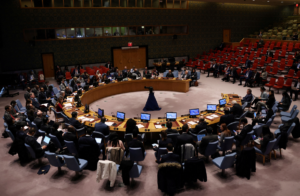An Iowa City councilmember is calling on her colleagues to have a serious discussion about abolishing the police, as part of the city’s efforts to restructure its police force. Councilmember Laura Bergus made her case in an opinion piece published in the Cedar Rapids Gazette on Sunday.
In her piece, Bergus says the time has come for police abolition to be on the table as a matter of policy discussion, arguing that modern policing is “premised on dominance by force,” and that it leaves many feeling unsafe, with Black and brown people disproportionately feeling the negative, and at times deadly, impacts.
“[Policing] condones the use of violence, even deadly violence, for the sake of compliance. Even the gentlest arrest is inherently dehumanizing. Nearly every level of police violence is enshrined in the law. If an officer oversteps, accountability is rare,” Bergus wrote.
According to state public health statistics, in 2019 “homicide and legal intervention” was a leading cause of death for African Americans aged 15-22 in Iowa. According to the Centers for Disease Control and Prevention, this includes deadly interactions with law enforcement.
Bergus told IPR that she began reading about police abolition in earnest around 2017 and that her thinking has been shaped by last summer’s sustained protests calling for an end to police brutality and systemic racism in the wake of the killing of George Floyd.
In the wake of last summer’s protests, local activists spurred the Iowa City City Council to outline 17 specific actions to combat systemic racism, including developing a “preliminary plan to restructure the Iowa City Police Department (ICPD) towards community policing.” Bergus says that abolition should be a part of the discussion as the city reviews its preliminary plan.
Piecemeal reforms to policing are insufficient, she says, arguing that the system is too deeply entrenched to be unraveled and instead must be replaced.
“This system cannot be undone by even the most compassionate and good police officers, like those who serve in the Iowa City Police Department,” she wrote. “Equity in community safety requires systemic change.”
A different system can replace modern policing, Bergus says, one built on comprehensively addressing a slate of basic human needs that can contribute to crime, struggles such as poverty, housing insecurity, hunger and mental illness.
“I just felt it was necessary to at least have a conversation about this option being within the universe of possibilities, because we haven’t even…haven’t even gone there yet. And I do think people want to live in a world where police aren’t necessary,” Bergus told IPR.
Abolition doesn’t mean an end to emergency response, Bergus makes clear, but would entail diverting calls for service to other unarmed professional interveners, akin to firefighters and paramedics.
“We can really push and prioritize prevention and diversion,” she said. “That’s what I’m talking about. That’s in line with what I think the whole council is talking about.”
Bergus said that she spoke with her colleagues on the City Council, as well as the city manager and police chief, to give them advance notice before publishing the piece.
Asked for a response from the Iowa City Police Department, Captain Denise Brotherton declined.
“The ICPD doesn’t comment on individual councilor’s editorial commentaries,” Brotherton wrote.
Bergus’ piece has already drawn backlash from the right and the left. The Twitter account for the Iowa Freedom Riders, a local Black Lives Matter activist group, tweeted “this means nothing until [Laura Bergus] puts words into action.”
Bergus acknowledged the political pushback around reimaging policing, saying that the overall reaction to her article has been “not great.” But she says she hopes a good faith, big picture discussion is possible.
“I just hope that anyone who…who sees and hears this conversation approaches it with an open mind and an open heart and a consideration for what’s possible in our community in the future,” she said.
The Iowa City City Council is holding a meeting Tuesday on its 246-page Preliminary Plan to Accelerate Community Policing.




